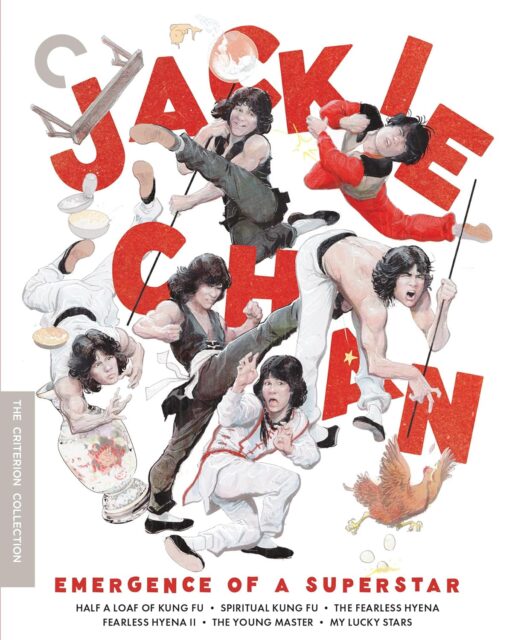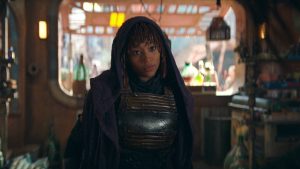
The post Home Video Hovel: Jackie Chan: Emergence of a Superstar, by Rudie Obias appeared first on Battleship Pretension.
After a career making movies that spans more than 60 years (and still going strong), it’s pretty clear why Jackie Chan is a superstar — especially with his films during the mid ‘90s and early 2000s. Movies like Rumble in the Bronx and Supercop (Police Story 3), as well as the Rush Hour, Shanghai, and Kung-Fu Panda movies made him a household name in the U.S. However, Chan had a well-regarded and very successful film career throughout the ‘80s and early ‘90s in Hong Kong with the Police Story, Project A, and Armour of God films series.
But his early work leading up to his success is the frame of reference for the four-Blu-ray disc boxed set Jackie Chan: Emergence of a Superstar from the Criterion Collection. Usually relegated to gas station DVDs and comic book convention bootlegs, this collection is worth a look for any Jackie Chan fan because it highlights a few of his underseen movies, which are presented with a pristine 2K digital picture and audio restoration.
Although the films — which span between 1978 to 1985 — vary in quality, each one showcases the seeds that would ultimately become the box office powerhouse that is Jackie Chan (it’s the stunts and charisma, stupid!). These films also show that Jackie Chan is just as much a charming physical comedic actor, as he is a thrilling and fast martial arts fighter and choreographer. It’s as if Buster Keaton or Harold Llyod made Kung-Fu flicks instead of silent-era comedies.
Half a Loaf of Kung-Fu
Released in 1978 and directed by Chan Chi-hwa, Half a Loaf of Kung-Fu is a delightful romp that’s full of eye-popping colors and super cartoon-ish action that’s worth a chuckle — especially when it involves Jackie Chan (who is credited as Jacky Chan) eating, what appears to be, spinach to gain Popeye-like super strength to do away with a gang of bad guys in a dream sequence. It really sets the tone of the entire boxed set, as a clear send-up and parody of the kung-fu movie genre.
Spiritual Kung-Fu
Also released in 1978, but directed by Lo Wei, Spiritual Kung-Fu combines smart martial arts choreography with comedy and ghosts that finds Jackie Chan’s Lung Yi-lang as the class clown at a Shaolin temple. Lung learns a new spiritual style of Kung-Fu called “Five Style Fists,” as he defends the temple from an invading troupe. The film looks sharp and clean, while the story is simple enough to hang excellent fights and action. Chan definitely leans into the comedy, as he also shows why he’s such a screen presence.
The Fearless Hyena
The Fearless Hyena, which was released in 1979, is Jackie Chan’s directorial debut. Although he was in the director’s chair for this film, Chan also served as co-screenwriter, martial arts choreographer, and, of course, star. It really shows his ambition to have a hand in nearly every facet of filmmaking, while the film itself is serviceable. The story is simple enough with Chan as a lazy student who learns a new style of Kung-Fu from his grandfather, played by James Tien. He uses this new technique to make money, only to anger the Ying Yee clan for using their name for his new school. The leader of the clan wants revenge and kills his grandfather, which forces the lazy student to grow up and search for vengeance.
Jackie Chan showcases an artfulness that’s not typical of most Kung-Fu films of the era, especially in his camerawork and choreography — namely with the hilarious chopstick duel.
Fearless Hyena II
After the box office success of The Fearless Hyena, Jackie Chan “came back” with 1983’s Fearless Hyena II. Chan was in a transition in his career while this movie was in production, as he left Lo Wei Motion Picture Company (the studio behind the first four movies in this set) for famed film studio Golden Harvest. As a result, Chan appears in the film as stunt doubles and archived footage from his past movies, The Fearless Hyena and Spiritual Kung-Fu.
Although there are some flourishes from director Chan Chuen, Fearless Hyena II is the weakest movie in the boxed set and very much skippable. However, there is a fight scene in a tea house that’s worth watching, but you can also catch it on YouTube.
The Young Master
Touted as a “superproduction,” The Young Master is Jackie Chan’s first film with Golden Harvest and his second directorial effort. Released in 1980, the movie follows Lung, played by Chan, a mediocre student who is caught between rival martial arts schools.
The Young Master is a marked improvement from The Fearless Hyena movies with smoother pacing from story beats to action, while the character work is more compelling and impactful than any of Chan’s movies in this boxed set. This is thanks in part to co-screenwriter Edward Tang who became one of Jackie Chan’s long-time collaborators with movies, like Rumble in the Bronx, Mr. Nice Guy, as well as the original Police Story trilogy.
My Lucky Stars
The second film in the Lucky Stars trilogy, My Lucky Stars, which was released in 1985 and directed by Sammo Hung, follows Muscles, played by Chan, an undercover Hong Kong cop on the trail of jewel thieves in Tokyo. After his partner Ricky, played by Yuen Biao, is captured, he recruits a ragtag gang of his old orphanage friends — Kidstuff (Hung), Roundhead (Eric Tsang), Sandy (Richard Ng), Herb (Charlie Chin Chiang-Lin), and Rawhide (Stanley Fung Sui-fan) — to help him take down a nasty crime ring and lethal ninja gang (yes, there are ninjas in this movie) in a hardboiled crime film mixed with a sex comedy.
My Lucky Stars is, far and away, the best movie in the Criterion Collection’s Jackie Chan: Emergence of a Superstar boxed set. It’s also a breath of fresh air being the only film in the set that takes place in modern times instead of ancient China with car chases, amusement parks, and gun play. Hung’s camerawork and editing is sharp and exciting, while Chan’s glowing on-screen persona is bright and charismatic — even though he’s only bookended in the film.
Unfortunately, the other two films in the trilogy — Winners and Sinners and Twinkle, Twinkle, Lucky Stars — were not also part of the boxed set. Although My Lucky Stars is a standalone, self-contained film, it just would’ve been nice to have all three together.
Meanwhile, the film collection offers a wide range of bonus features, such as interviews with the stars, as well as film critics and historians, commentary tracks, trailers (most notably Golden Harvest’s sizzle reel to sell The Young Master at the Cannes Film Festival), and much more. It also includes an essay from pop culture writer Alex Pappademas on Chan’s early career and his Bugs Bunny-esque on-screen persona. Jackie Chan is, in fact, a stinker!
The Criterion Collection’s boxed set is a must for any Jackie Chan fan or fan of Asian Cinema from the late ‘70s to mid-’80s. It shows how the Kung-Fu film genre evolved from classic Peking opera-style period pieces to the Hong Kong crime thrillers. While not every film in the collection is a hit, it’s worth watching The Young Master and My Lucky Stars as the big standouts, if you just want a taste.
Afterwards, you can also check out movies, like Police Story, Police Story 2, Drunken Master, Armour of God II: Operation Condor, Project A and Project A Part II, and Crime Story all headlining Jackie Chan — a superstar.
The post Home Video Hovel: Jackie Chan: Emergence of a Superstar, by Rudie Obias first appeared on Battleship Pretension.
The post Home Video Hovel: Jackie Chan: Emergence of a Superstar, by Rudie Obias appeared first on Battleship Pretension.


